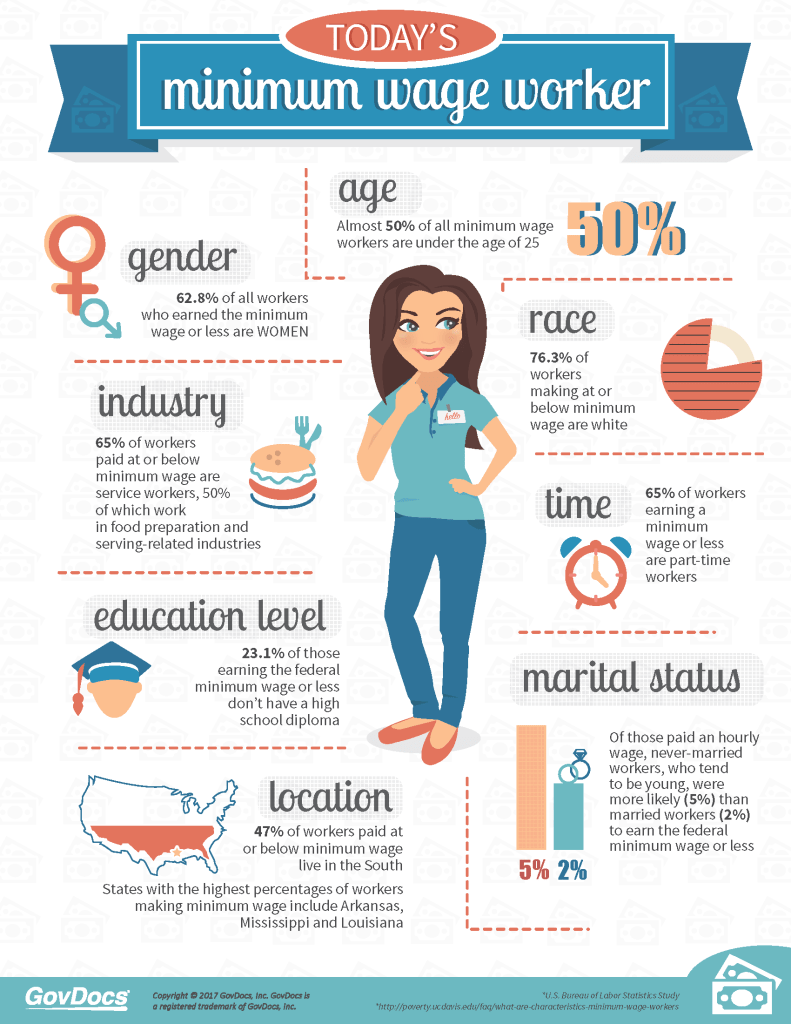Where did the minimum wage come from?
Under federal law in the US, the minimum wage is the lowest hourly salary that a worker may be paid. It is a legally mandated hourly wage floor below which nonexempt employees may not be offered or accept work. Minimum wage laws were first enacted in Australia and New Zealand in order to boost the income of unskilled workers. A national minimum wage is now in place in the majority of modern developed economies, as well as in many developing ones. Among the outliers are Sweden, Norway, and Singapore. A variety of people are exempt from paying the minimum wage. Individuals in these groups are often paid less than the minimum wage in order to attract businesses. This term relates to the legally enforceable nature of minimum wages, regardless of how they are set. Minimum wages can be established by statute, a judgment of a competent authority, a wage board, a wage council, or industrial or labour courts or tribunals.
Minimum salaries can also be established by making terms of collective bargaining agreements legally binding. The goal of minimum wages is to safeguard workers from unfairly low pay. They contribute to ensuring a just and equal share of the fruits of progress for all, as well as a minimum living wage for all employed and in need of such protection. Minimum wages can also be part of a policy to combat poverty and eliminate inequality, especially disparity between men and women, by advocating the right to equal pay for equal work.

What could happen with a rising wage?
The push for a higher minimum wage, or a “living wage” – whichever that term is defined at the time – comes back on a regular basis as a solution to solve the concerns of the working poor. In other aspects, it may be a matter of mindset rather than economics: conservatives regard the minimum wage as an attack on free markets, whilst social progressives see it as a policy that may drive the economy and boost everyone’s prosperity. It’s not a straightforward topic and both sides can point to issues with the minimum wage. Raising the minimum wage increases the cost of hiring low-pay employees. As a result, some businesses will hire fewer employees than they would if the minimum wage were lower.
“No family gets rich from earning the minimum wage. In fact, the current minimum wage does not even lift a family out of poverty.” —Jon Corzine
If you’re a business, the immediate concern with a higher minimum wage is the possibility of increased labour costs. It’s especially challenging if you’re in an industry like foodservice, where margins are already razor-thin and many of your employees are paid below the minimum wage. Employment may, however, rise for individual workers or under certain conditions. Another issue with the minimum wage is that it may increase unemployment. Changes in employment would be reflected in the number of jobless workers, rather than only unemployed. People who are unemployed include both individuals who have left the labour force (for example, because they believe there are no jobs available for them) and those who are actively looking for work.
Teacher Resources
Level: Intermediate: B1/B2
Running Time: 90 minutes +
Key Terms
To understand this debate it is useful to learn the following words and concepts.
Unemployment
Living wage
Economy
Labour force
Equal pay
Equal work
Poverty
Payroll
Great recession
Employment
Pros and Cons of increasing the minimum wage
An increase in minimum wage drives unemployment rates
Agree
Businesses will be able to hire as many staff as possible if wages rise. That is a valid concern, particularly for small enterprises, but evidence from the actual world does not always support that for the economy. A boost in the minimum wage could force a small number of people out of work indefinitely, preventing them from benefiting from higher wages. On the other end of the scale, a large number of people may cycle in and out of work on a regular basis, experiencing joblessness for brief periods but earning more money during the weeks they worked. A higher minimum wage would raise the income of some families above the poverty line, lowering the number of people living in poverty by raising the income of low-wage workers who have jobs. Low-wage workers, on the other hand, will see their earnings plunge, and in certain cases, their family income will fall below the poverty line.
Disagree
If minimum wages limit the employment of low-skilled employees, they are no longer a “free lunch” to support poor and low-income families, but rather a trade-off of advantages for some versus costs for others. Although research findings are not unequivocal, evidence suggests that minimum wages, particularly in the United States, restrict the number of employment accessible to low-skilled employees. Although it decreases labour demand by increasing the marginal cost of hiring a new worker, a higher minimum wage widens the difference between the expected returns to employment and unemployment, causing jobless workers to put in more effort to find work. Economic conditions, organizational changes, and the demand for a company’s services and commodities all have an influence on an employer’s ability to compensate employees at highly competitive wages. Employees may experience fury and disappointment as a result of inadequate pay, as well as stress, low morale, and unemployment.
An increase in minimum wage affects labour costs
Agree
An increase in the minimum wage may make your employees unhappy with their pay and drive you to raise your own rates. Increasing the minimum wage that companies must pay decreases total hours worked (total jobs multiplied by hours per job), but only somewhat if minimum wage levels are low in comparison to typical incomes. Labour expenses are influenced by a variety of regulations, including the minimum wage, overtime pay, payroll taxes, and hiring subsidies. Policies that raise labour expenses can have a significant impact on both employment and hours in individual businesses as well as the general economy. The law of demand operates in labour markets as follows: a higher pay or wage— that is, a higher price in the labour market—leads to a decrease in the amount of labour desired by employers, whereas a lower compensation or rate leads to an increase in the quantity of labour desired by employers.
Disagree
Increasing the minimum wage businesses must pay their employees safeguards companies from exploiting workers who have few choices. The requirement for employers to pay their employees improves salaries among low-wage workers who hold their jobs. Workers whose earnings would normally lie between the previously applicable minimum wage (state or federal) and the proposed minimum wage, and who would either be jobless or see an increase in earnings in a typical week. Workers whose hourly salaries fall between the proposed minimum and the proposed minimum plus 50 per cent of the increase in the federal minimum over their previously applicable (federal, state, or municipal) minimum wage. Only a subset of those workers would have seen a rise in pay. Increasing the penalty that businesses pay for overtime labour may promote the creation of new jobs, which can help to reduce unemployment.
The minimum wage should be increased every year
Agree
Potential workers may apply for a position with a higher starting compensation that they would not typically consider for a job with a lower starting pay, therefore significantly expanding the talent pool. Employees who are well compensated may be more contented, which can enhance morale. Paying employees a greater wage encourages them to spend more money, which benefits the economy; in some situations, this might result in increased demand for the organization’s goods and services. It has been suggested that raising the minimum wage offers a second, less evident benefit: enhanced employee morale. Not only will happy workers result in a more unified, productive team, but they may also contribute to better levels of customer satisfaction. Furthermore, if employees are content with their jobs and salaries, they are less likely to leave, lowering the employer’s hiring and training expenditures.
Disagree
A minimum salary may result in cost-push inflation. This is because businesses’ expenses are anticipated to rise, which will be passed on to consumers. This is considerably more likely if salary disparities remain. In certain circumstances, a higher minimum wage may raise costs, forcing a company to go out of business because it cannot pay wage expenditures. This might be a particular issue if the company is operating in a worldwide market and their higher pay expenses render them uncompetitive in comparison to low-wage cost countries. This means that even a slight adjustment in the price of low-wage labour can have a significant impact on its demand. The minimum wage should grow in tandem with the cost of commodities. As a result, a minimum wage that is excessively high may increase unemployment among low-paid employees.
Conclusion
Employers and employees should be aware of both sides of the issue and prepare for a change in federal minimum wage law, which is probable. Those who oppose a minimum wage argue that market forces should take precedence. If a company’s competition for exceptional employees is fierce, it may have little choice but to adjust compensation to keep employees from leaving.
Read more
U.K. Hikes Minimum Wage by 6.6% in Budget Boost for Millions
Minimum wage for 23 year-olds to rise to £9.50 an hour
The minimum wage would be $61.75 an hour if it rose at the same pace as Wall Street bonuses
Images of people used under license from Generated Photos







